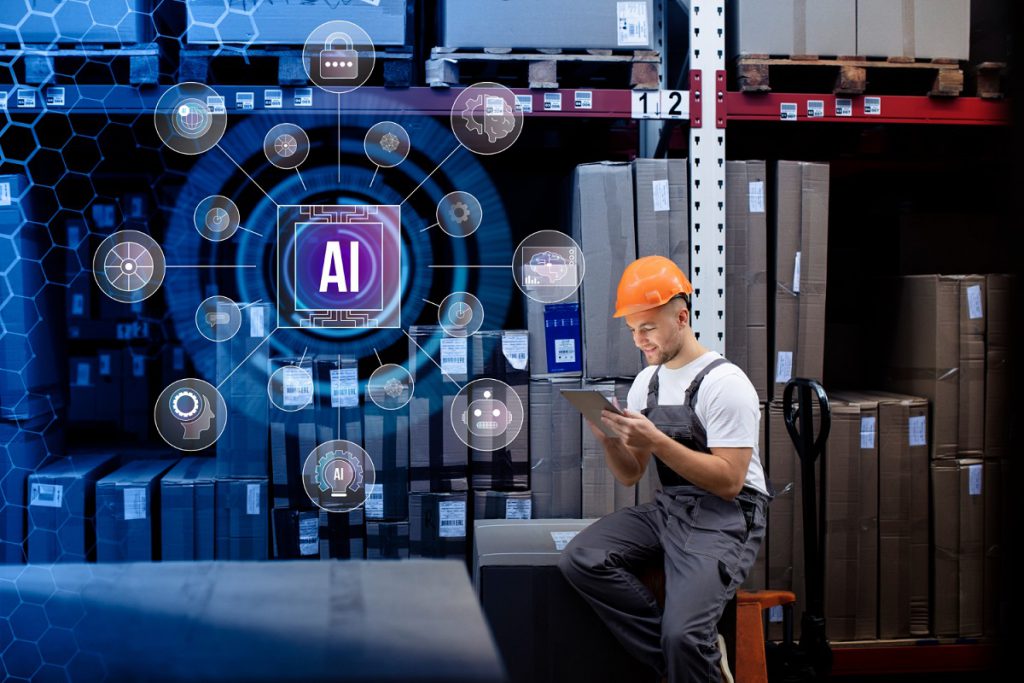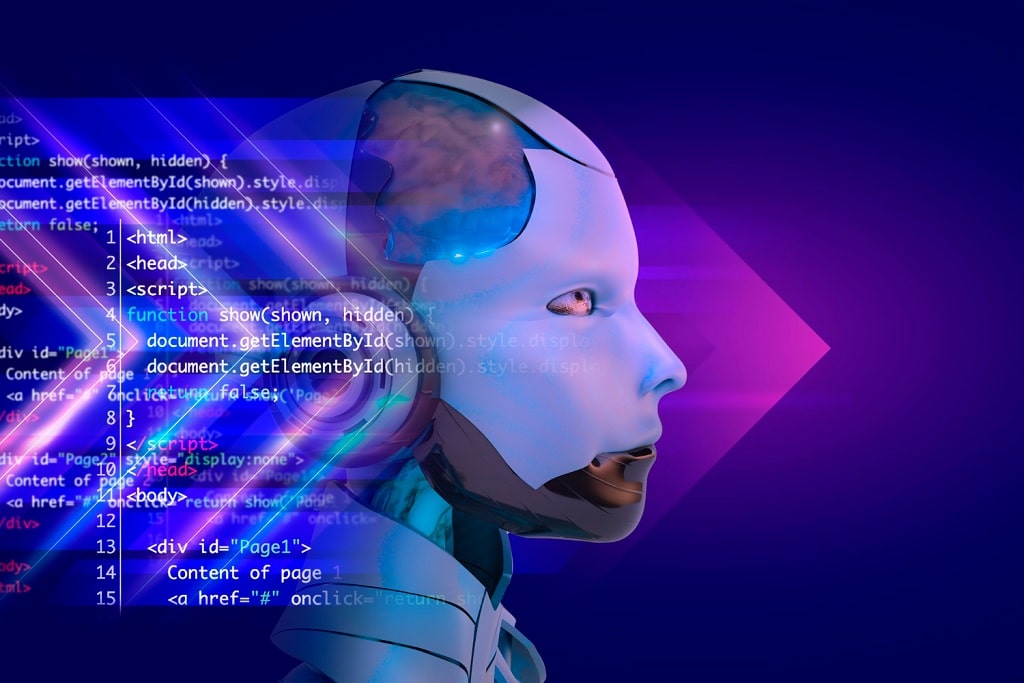Manufacturing industry uses machines for product manufacturing. These machines needs maintenance at proper time otherwise it could lead to financial burden on industry owner.
Integrating AI in machines used in production unit we can monitor the performance in speed, detect and identify performance related issues with predictive analytics that helps in proper maintenance of expensive heavy machines.
In this blog we will explore several benefits of artificial intelligence implementations in manufacturing industry.

1. Enhanced Operational Efficiency
Artificial Intelligence in manufacturing streamlines operations by automating repetitive tasks and optimizing workflows.
Smart algorithms analyze production data in real-time, enabling swift decision-making and minimizing downtime. This efficiency boost translates to increased production output and a reduction in operational costs.
Related: Revolutionizing Business Processes with AI Application Development Services
2. Predictive Maintenance for Optimal Uptime
AI-driven predictive maintenance is a game-changer for manufacturing equipment. By analyzing historical data and machine performance metrics, AI algorithms forecast potential issues before they escalate.
This proactive approach not only prevents unexpected breakdowns but also maximizes equipment uptime, contributing to a more reliable and cost-effective production environment.
3. Quality Assurance and Defect Reduction
The implementation of AI-powered computer vision in manufacturing ensures unparalleled precision in quality control.
Automated inspection systems can identify defects, anomalies, and variations in real-time, significantly reducing the likelihood of subpar products reaching the market.
This not only enhances the reputation of the manufacturer but also minimizes waste.
4. Supply Chain Optimization
AI algorithms optimize supply chain management by predicting demand, identifying potential bottlenecks, and recommending inventory levels.
This level of intelligence allows manufacturers to maintain leaner inventories, minimize storage costs, and respond more effectively to market fluctuations, ultimately improving overall supply chain efficiency.
Related: Benefits of Advanced AI Solutions for Businesses
5. Energy Consumption Optimization
Artificial Intelligence aids in the optimization of energy usage within manufacturing facilities.
Machine learning algorithms analyze energy patterns and recommend adjustments to reduce consumption during non-peak hours or low-demand periods.
This not only contributes to sustainability goals but also leads to significant cost savings in the long run.
Using AI we can also find alternative sources of energy that can be utilized in manufacturing industry for product manufacturing.
6. Customization and Personalization
AI empowers manufacturers to offer AI customizable products at scale. By analyzing customer preferences and market trends, manufacturers can tailor their production processes to meet individualized demands.
This flexibility not only enhances customer satisfaction but also provides a competitive edge in a market driven by personalized offerings.
7. Data-Driven Decision Making
AI implementations generate valuable insights from vast datasets, enabling informed decision-making at every level of the manufacturing process.
From production planning to resource allocation, these insights contribute to strategic decision-making that aligns with business objectives and market dynamics.
Related: The Role of Advanced AI Solutions in Modern Businesses
8. Improved Workplace Safety
AI-powered systems enhance workplace safety by identifying potential hazards and ensuring compliance with safety protocols.
From monitoring equipment performance to analyzing worker behavior, these systems contribute to the creation of a safer working environment, reducing the risk of accidents and injuries.
9. Industry specific Compliance and regulatory adherence
Manufacturing industry needs to adhere to ethical practices in production unit.
They need to maintain the industry standards in quality of manufactured products and comply with the rules and regulation set by local and international government agencies to avoid huge financial loss in the form of penalties.
There are lots of risks involved in manufacturing of products. These documentation tasks can be performed easily with the help of generative ai based applications where we can prepare product specification details for consumer use, installation guide etc.
Related: Top 10 Future Trends for AI in Banking Sectors
10. AI enabled Robotic process Automation for repetitive tasks
Industry owners can reduce the manual dependency with the effective implementation of ai enabled robotic process automation that can optimize and automate the workflow in manufacturing unit.
Robots do not need salary, or tired of performing repetitive tasks. That is why they are cost effective and efficient than humans.
11. AI driven Machine Maintenance system
Manufacturing industry use heavy machines that need to be maintained from time to time to ensure better performance, improving efficiency and productivity in the production unit.
This can be done remotely trough ai driven machine maintenance system that keeps records of daily tasks, power consumption, and output.
It can perform complicated mathematical calculations for depreciation of machine and recommend enhancements that can increase the lifespan of the machine using artificial intelligence.
12. Highly optimized logistics for quicker distribution of products in market
Perhaps the profitability of the industry owners depends on the efficient logistics.
By integrating machine learning and artificial intelligence in the logistic applications we can optimize the route in more efficient ways saving time, money and efforts.
This helps in reducing the overhead cost of the products on transportation that helps in reducing the price of commodity or product.
Related: Benefits of Customized AI Solutions for Aerospace Sectors
13. Fraudulent activity in the Industry
Using efficient management system at different hierarchical level we can monitor the tasks of all workers and staffs using online portal.
These applications can easily identify any fraudulent activity like stealing the raw materials from production unit, using bad quality materials for product manufacturing etc.
14. Product design improvement with the help of AI applications
Product design does play important role in improving the sales and profit making of company. That is why optimizing the product design is crucial tasks for every business owners that requires high artistic ability.
These tasks can be done efficiently with the help of AI enabled applications. We can identify the product defect, recommend product design that are optimized and uses fewer raw materials in the product manufacturing process.
Conclusion: The Intelligent Future of Manufacturing
As the manufacturing industry embraces the era of Artificial Intelligence, the benefits reverberate across every facet of operations.
From optimizing efficiency and reducing costs to enhancing product quality and sustainability, the advantages are manifold.
Manufacturing industry owners can revolutionize with technological purgation and ai implementations in production unit.
It can help us in automating the work flow in business in an optimized way, reduce the cost of manufacturing, enhancing the operational efficiency of machines and improve quality of products with ai enabled product testing tools.
You may like to read:




